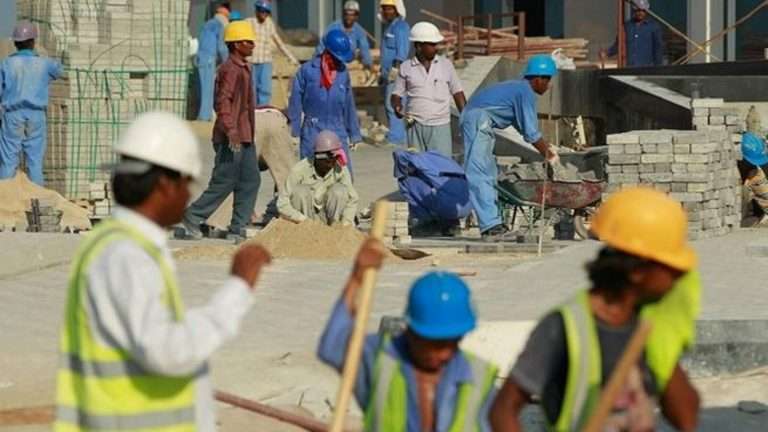Latest News
- Amir Of Kuwait And Jordan King Renew Commitment To Regional Secu...
- 37 Arrested With Narcotics And Firearms
- Outrage Over Candidate's Arrest
- Six Stores Shut Down In Jahra For Selling Fake Goods
- Peddlers Caught With Drug Pills And Crystal Meth
- PAFN Shuts Down Restaurants And Bakeries Over Violations
- MoI Officer And Lawyer Jailed On Fraud Charges For Bad Cheques
- Thousands Of Bangladeshis Gathered To Pray For Rain
- Kuwait University Symposium Addresses Student Counselors' Role I...
- Kuwait Affirms The Importance Of Group Work In Addressing Common...
- Urgent Call For Kuwaitization: Civil Service Commission Aims For...
- Kuwait Halts Work Permits For Egyptian Workers Amidst New Regula...
Foreign Workers Leaving Gulf Countries Will Not Lead To Economic Drain

We have been surprised by many in the foreign media trying to falsely analyze the impact of foreign labor migration out of the Gulf states due to the coronavirus pandemic. Such analysis has indeed become part of orchestrated campaigns aimed at spreading panic of an imminent collapse to these economies.
On the ground, our point of view is completely different. We even believe the positive effects of laborers voluntarily flying back to their countries far outweigh some of the negatives foreign media is trying to portray.
But how? This is what we will briefly outline based on available data. It is expected that some 4 million to 4.5 million foreign workers will leave, who together make up approximately 10 per cent of the GCC’s total population. Let’s look at the nature of the workforce leaving or expected to leave. Most of them fall within the low/unskilled categories and working in the construction and services sector. Almost half of them were staying on as “illegal” residents, as evidenced by the data released by Kuwait about the number of workers who left the country. Therefore, those workers were considered a burden rather than a benefit, and even caused many economic and social problems. And it means their leaving is a positive outcome.
Absorbing their departures
The vast majority of the other half who left due to the decline in economic activities, especially in construction, services, retail and tourism. Such a decline will certainly lead to a decrease in demand for goods and services in the local markets, in itself a negative development that will affect growth rates.
But the fact remains most deportees were living in cheap and crowded labor accommodations, and now would be a good time to truly restructure the labor market.
In addition to their economic, financial and social dimensions, the positive results of labor migration are many. This includes reducing pressure on the infrastructure and public services, cutting labor allocations in budgets and a chance to set aside more funds on quality of services and development projects.
Moreover, a decrease in demand, especially on food and basic consumer goods – 80 per cent of which are imported – will support the trade balance of GCC countries.
Remittance drops
Remittances by foreign laborers will drop significantly, which will help enhance domestic liquidity, especially as the volume of transactions had reached $120 billion last year. Foreign transfers are expected to decline to less than $100 billion this year due to reverse migration and salary cuts in the private sector.
At the social level, the presence of an unskilled labor force had been a source for social unrest and abuses, that are alien to traditional Gulf societies. With them leaving the GCC, this means more social peace and less pressure on security agencies that track the safety and stability of society, in addition to restoring some balance to the demographic composition of these states.
No impact
As for infrastructure projects and utilisation of public services, the departures will not affect them. Various infrastructure projects are mostly complete, and there is a surplus of housing units, which requires a rebalancing of the real estate sector.
The past decade has witnessed notable developments in digital services, which will ensure delivery of superior and less costly services, including financial. Thus, we will experience positives and quite unlike the panic the foreign media is trying to broadcast.
The skilled competencies provided by expat workers will continue to remain in the Gulf and will always be welcome to contribute to the development process. A process that will restore its momentum once the pandemic is over.
Trending News
-
 Kuwait Implements Home Biometrics Services Ahead O...
14 April 2024
Kuwait Implements Home Biometrics Services Ahead O...
14 April 2024 -
 Kuwait Airways Provides Update On Flight Schedule...
14 April 2024
Kuwait Airways Provides Update On Flight Schedule...
14 April 2024 -
 Kuwait Airways Introduces Convenient Home Luggage...
15 April 2024
Kuwait Airways Introduces Convenient Home Luggage...
15 April 2024 -
 Expat Residency Law Amended By Kuwait Ministerial...
20 April 2024
Expat Residency Law Amended By Kuwait Ministerial...
20 April 2024 -
 Gathering For Eid Al-Fitr Prayers: Kuwaiti Citizen...
10 April 2024
Gathering For Eid Al-Fitr Prayers: Kuwaiti Citizen...
10 April 2024 -
 Two Expats Are Arrested For Stealing From Salmiya...
17 April 2024
Two Expats Are Arrested For Stealing From Salmiya...
17 April 2024 -
 An Egyptian Expat Dies At Kuwait's Airport
11 April 2024
An Egyptian Expat Dies At Kuwait's Airport
11 April 2024 -
 Kuwait Airways Resumes Flights To Beirut And Oman...
15 April 2024
Kuwait Airways Resumes Flights To Beirut And Oman...
15 April 2024 -
 Bay Zero Water Park Kuwait: Summer Season Opens Ei...
11 April 2024
Bay Zero Water Park Kuwait: Summer Season Opens Ei...
11 April 2024 -
 Temperature Increases Cause Electricity Load Index...
21 April 2024
Temperature Increases Cause Electricity Load Index...
21 April 2024












Comments Post Comment